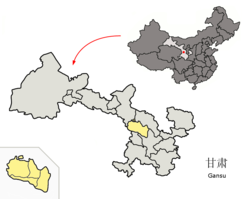Lanchow
|
Lanzhou 兰州市 |
|
|---|---|
| Prefecture-level city | |
 |
|
 Location of Lanzhou City (yellow) in Gansu and the PRC |
|
| Location in China | |
| Coordinates: 36°02′N 103°48′E / 36.033°N 103.800°ECoordinates: 36°02′N 103°48′E / 36.033°N 103.800°E | |
| Country | China |
| Province | Gansu |
| County-level divisions | 8 |
| Government | |
| • Party Secretary | Li Rongcan |
| • Mayor | Zhang Jianping |
| Area | |
| • Prefecture-level city | 13,300 km2 (5,100 sq mi) |
| • Urban | 1,088 km2 (420 sq mi) |
| Population (2010 census) | |
| • Prefecture-level city | 3,616,163 |
| • Density | 270/km2 (700/sq mi) |
| • Urban | 2,177,130 |
| • Urban density | 2,000/km2 (5,200/sq mi) |
| Time zone | China Standard (UTC+8) |
| Postal code | 730000 |
| Area code(s) | 931 |
| License plate prefixes | 甘A |
| GDP (2015) | CNY 200 billion |
| - per capita | CNY 57,191 |
| Website | http://www.lz.gansu.gov.cn (in Chinese) |
|
Rugosa Rose |
|
| Lanzhou | |||||||||||||||||||||||||||||||||||||

"Lanzhou" in Simplified (top) and Traditional (bottom) Chinese characters
|
|||||||||||||||||||||||||||||||||||||
| Simplified Chinese | 兰州 | ||||||||||||||||||||||||||||||||||||
|---|---|---|---|---|---|---|---|---|---|---|---|---|---|---|---|---|---|---|---|---|---|---|---|---|---|---|---|---|---|---|---|---|---|---|---|---|---|
| Traditional Chinese | 蘭州 | ||||||||||||||||||||||||||||||||||||
| Postal | Lanchow | ||||||||||||||||||||||||||||||||||||
| Literal meaning | "Orchid [Hills] Prefecture" | ||||||||||||||||||||||||||||||||||||
|
|||||||||||||||||||||||||||||||||||||
| Transcriptions | |
|---|---|
| Standard Mandarin | |
| Hanyu Pinyin | Lánzhōu |
| Bopomofo | ㄌㄢˊ ㄓㄡ |
| Gwoyeu Romatzyh | Lanjou |
| Wade–Giles | Lan2-chou1 |
| IPA | [lǎn.ʈʂóu] |
| other Mandarin | |
| Xiao'erjing | لًا جِوْ |
| Dungan | Ланҗу |
| Wu | |
| Suzhounese | Lé-tseu |
| Yue: Cantonese | |
| IPA | [lȁːn.tsɐ́u] |
| Jyutping | Laan4-zau1 |
| Southern Min | |
| Hokkien POJ | Lân-chiu |
| Tâi-lô | Lân-tsiu |
Lanzhou is the capital and largest city of Gansu Province in Northwest China. The prefecture-level city, located on the banks of the Yellow River, is a key regional transportation hub, connecting areas further west by rail to the eastern half of the country. Historically, it has been a major link on the Northern Silk Road. The city is also a center for heavy industry and petrochemical industry. Lanzhou was previously ranked as one of the cities with the worst air quality in the world, due to industrial pollution and its situation in a narrow river valley. Government measures to reduce the pollution have had their effect, and in 2015 the city was awarded China's climate progress title.
Lanzhou is home to 3,616,163 inhabitants at the 2010 census and 2,177,130 in the built-up area (urban) of 1,088 square kilometres (420 sq mi).
Originally in the territory of the Western Qiang peoples, Lanzhou became part of the territory of the State of Qin in the 6th century BC.
In 81 BC, under the Han dynasty (206 BC–220 AD), it was taken from the Huns' Huandi Chanyu and made the seat of Jincheng commandery (jùn), and later of the Jincheng county (xiàn), later renamed Yunwu. The city used to be called the Golden City, and since at least the first millennium BC it was a major link on the ancient Northern Silk Road, and also an important historic Yellow River crossing site. To protect the city, the Great Wall of China was extended as far as Yumen. Parts of the Great Wall still exist within the built-up area.
...
Wikipedia


